Year reflections the Non-Government Gender Organisations’ Coordonating Council (NGOCC), Tuesday 31st December 2019
Notice: Undefined index: catFilterList in /home/zambi/public_html/wp-content/plugins/wp-likes/api.php on line 243
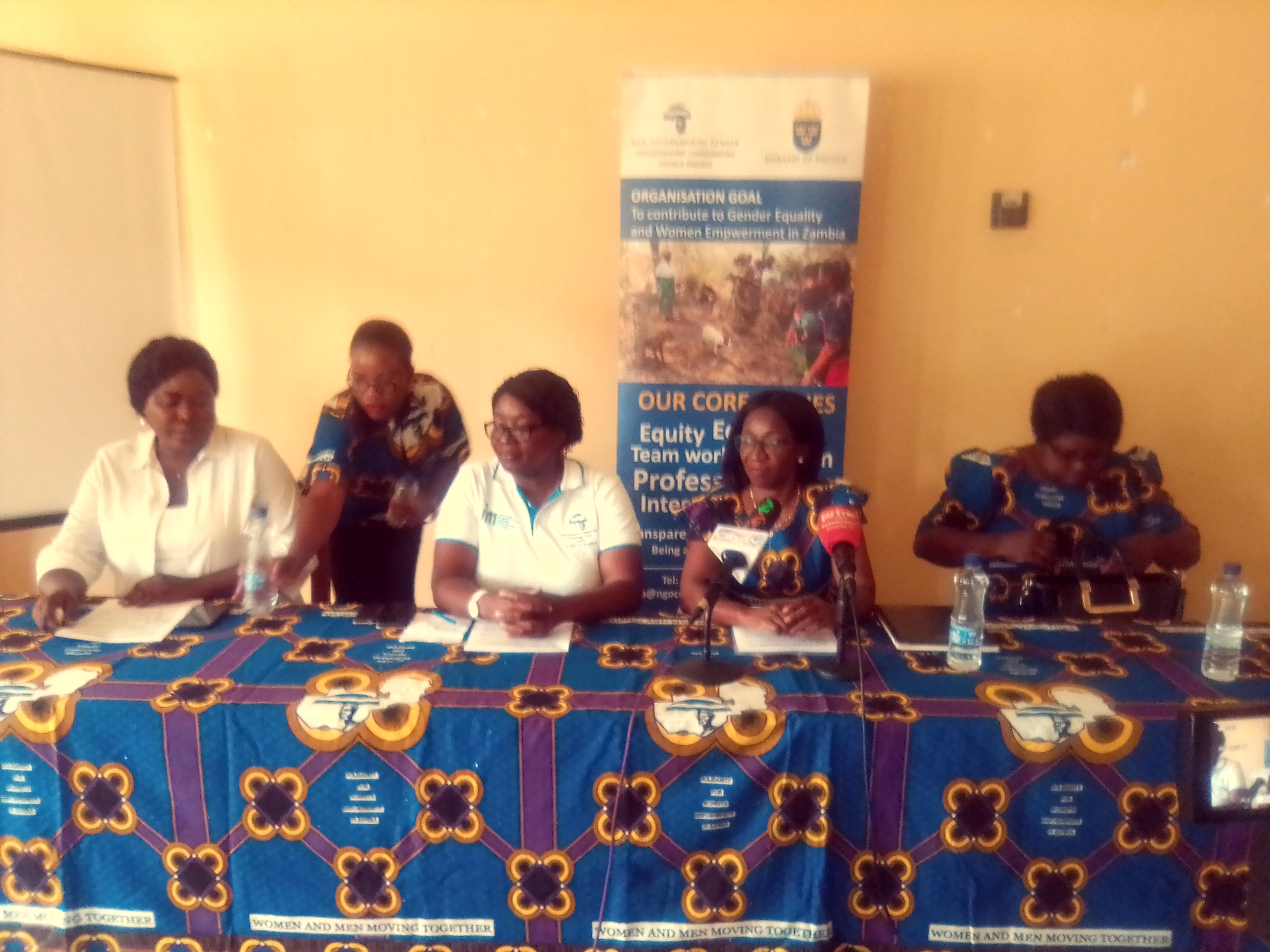
Left to right: NGOCC Operations and Administration Manager, Fridah Nkonde-Mubanga, Florence Lufunsa, Executive Director, Engwase Mwale, Board Chairperson, Mary Mulenga and Programs Manager Chilufya Chokwe Siwale in Lusaka on Tuesday 31st December 2019 – Picture by Derrick Sinjela
YEAR REFLECTIONS BY THE NON-GOVERNMENTAL GENDER ORGANISATIONS’ COORDINATING COUNCIL (NGOCC), 31st DECEMBER 2019
PREAMBLE
TODAY 31st December 2019, marks the end of yet another eventful year for the women’s movement. By the grace of God, we once again stand here to testify, the abundance of his mercies, – this far we have come, even as we look forward to the New Year 2020, we remain focused and desirous for gender equality to be attained in Zambia.
The end of year provides the opportunity for us as individuals, organizations and indeed as a nation, to introspect and reflect on the trajectory we are charting. It’s a time to take stock of the achievements, failures, challenges and indeed lessons we have picked during the year ending.
As aptly put by Aristotle, “Knowing yourself is the beginning of all wisdom.” Surely, we also agree with Bryant McGrill that “a people who have had little self-reflection live life in a huge reality blind-spot”.
In our reflection therefore, we first want to note that inequality levels in Zambia remained high in 2019 around 0.525, indicated by low numbers of women in leadership positions, challenges with access to health services especially maternal health facilities for women as well as low education progression rates to higher levels by female learners.
Even though the country has made strides in infrastructure development such as roads, schools and health posts, we note from our monitoring visits that most projects are yet to be finalised.
Further, the newly launched 2019 Human Development Index (HDI) Report states that Zambia has made improvements between 1990 and 2018 with the HDI value increasing from 0.424 to 0.591, an increase of 39.7 percent thereby ranking the country at 143 out of 189 countries and territories which puts the country in the medium human development category.
This improvement is based on the three indicators: Life Expectancy, Schooling Years and Expected Years of Schooling. Life expectancy at birth increased by 14.3 years from 49.2 years in 1990 to 63.5 years in 2018. On the other hand, schooling years increased by 2.4 years while the expected years of schooling increased by 4.5 years.
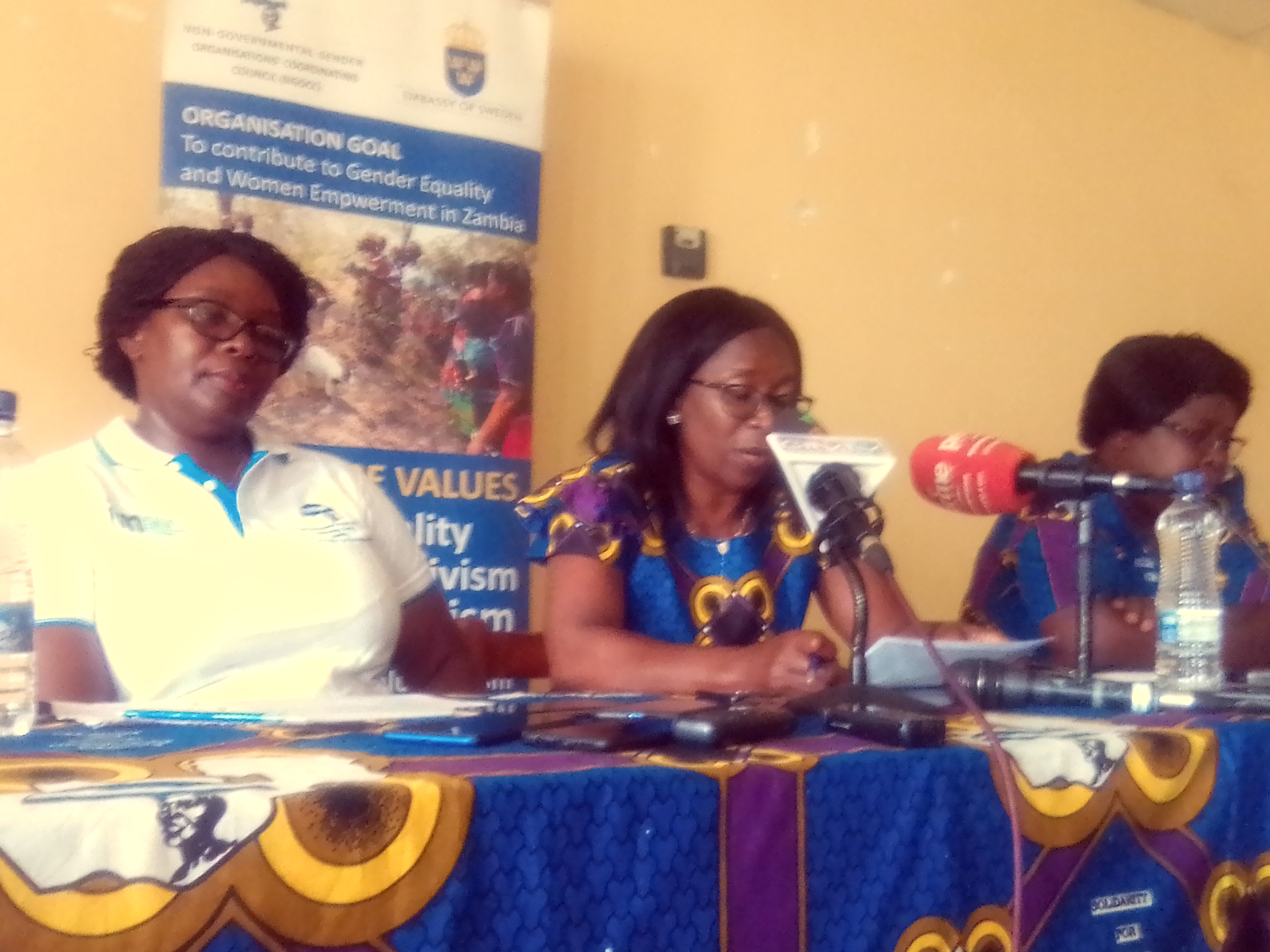
Left to right: NGOCC Executive Director, Engwase Mwale, Board Chairperson, Mary Mulenga and Programs Manager Chilufya Chokwe Siwale in Lusaka on Tuesday 31st December 2019 – Picture by Derrick Sinjela
Despite all these positives, we are aware that the country is still faced with a number of challenges which continued to impact on the livelihoods of the majority citizens during 2019. For example, not too long ago, we witnessed yet again increases in electricity tariffs and fuel pump prices, further straining the already economically constrained majority citizens. Let us analyze some issues as follows:
Zambia’s indebtedness
The women’s movement remains deeply concerned with the country’s indebtedness, with the latest official figures indicating a total of US$10.23 billion external debt as at end of June 2019. Domestic debt in terms of securities and bonds as at end June 2019 also rose to K60.3 billion. NGOCC is aware that debt repayments have had a toll on government’s expenditure on and provision of social services such as education, health and social protection.
We have sadly witnessed reduced funding allocation for most institutional operations within government during the year which has negatively impacted on the most vulnerable in our society, the majority being the women and children.
For example, we have noted the compromised quality of education due to absence of basic learning materials and equipment; health institutions have not been spared from the pressure of overstretched facilities and services including limited availability of essential drugs.
Constitution making through the National Dialogue
In 2019, an attempt was made at having a National Dialogue to promote national reconciliation and unity of purpose by the Church Mother Bodies which subsequently failed to meet its intended outcome.

Left to right: NGOCC Operations and Administration Manager, Florence Lufunsa, Executive Director, Engwase Mwale, Board Chairperson, Mary Mulenga and Programs Manager Chilufya Chokwe Siwale – Picture by Derrick Sinjela
Eventually we saw the Government proceed to enact the National Dialogue Forum Act which was to facilitate for the review of the Constitution Amendment Act of 2016, the Electoral Processes Act and the Political Parties Bill. Out of that process was born the now famous Constitution Bill 10 which has been a subject of national discourse in the recent past.
Our view is that the nation missed an opportunity to have a truly nationally-driven dialogue that would have addressed some of the political discontent and high levels of intolerance that the country has been witnessing. It has always been NGOCC’s position that the Church Mother Bodies have the moral and biblical responsibility to provide counsel whenever there is some dispute or indications of disunity in the nation.
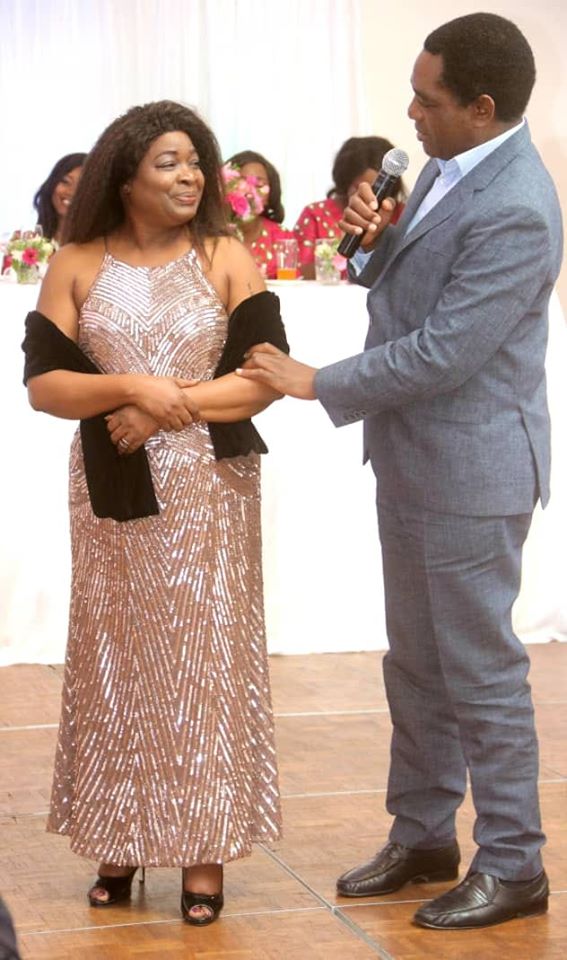
UNITED Party for National Deveopment (UPND) leader Hakainde Hichilema with wife Mutinta on Tuesday 31st December 2019
The women and men of God have the authority bestowed upon them by nature of their anointing to prevail upon difficult situations. It is our hope that as we go into 2020, ahead of 2021 General Elections, a process of honest and open dialogue will be undertaken, especially between the ruling party and the main opposition United Party for National Development (UPND).
It is still our considered view that there is need for an honest review of the law Electoral Processes and the Public Order Act before the 2021 elections.
With regards Constitution Bill 10, it was our submission to the Parliamentary committee that the Bill contains some progressive and a number of retrogressive provisions.
We are, therefore, happy that the Parliamentary Committee agreed with our position on a number of clauses that we submitted which are articulated in the Committee’s Report. Going forward, we would like to appeal to the Government to consider adopting the report of the Parliamentary Committee especially on the aspect of subjecting this important Constitution reform process to more broad-based consultation. In this regard, NGOCC will in 2020, engage both the ruling party and opposition political parties to find resolve to the impasse on the Constitution making process.
For far too long, Zambians have yearned for a good Constitution built on consensus, complete with an expanded Bill of Rights adopted through a National Referendum. Additionally, the gender equity and equality agenda should be fully implemented by the constitution of the Gender Equity and Equality Commission.
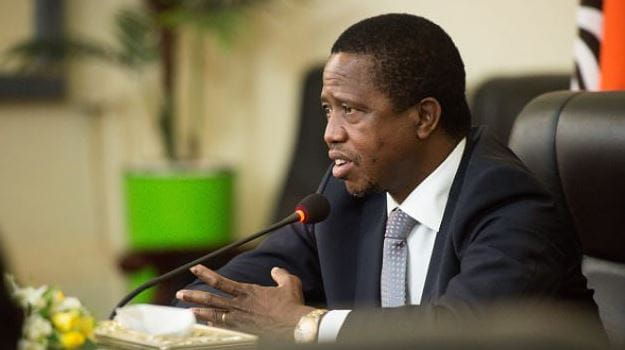
Dr. Edgar Chagwa Lungu on Zambia’s new dawn
We are still hopeful that the policy statement by His Excellency Dr. Edgar Chagwa Lungu on operationalizing the Gender Commission, did not fall on ‘deaf ears’ but that commitment will be shown by those responsible to work towards the realization of the Gender Equity and Equality Commission in the shortest time possible.
The Rule of Law and Justice Dispensation
Zambia’s Amended Constitution of 2016 guarantees equality of all citizens before the law and in line with the Constitution Values and Principles, the constitution seeks to uphold human dignity, equity, social justice, equality and non-discrimination for all citizens.
In addition, the Preamble of the said Constitution upholds human rights and “confirms the equal worth of women and men and their right to freely participate in, determine and build a sustainable political, legal, economic and social order”.
In this regard, NGOCC welcomed the court ruling that ordered all Cabinet Ministers, that had stayed in office beyond Parliament closure prior to the 2016 General Election, to pay back all their emoluments obtained during the said period. It is unfortunate that we come to the end of the year with no information to the public that this court ruling has been complied with.
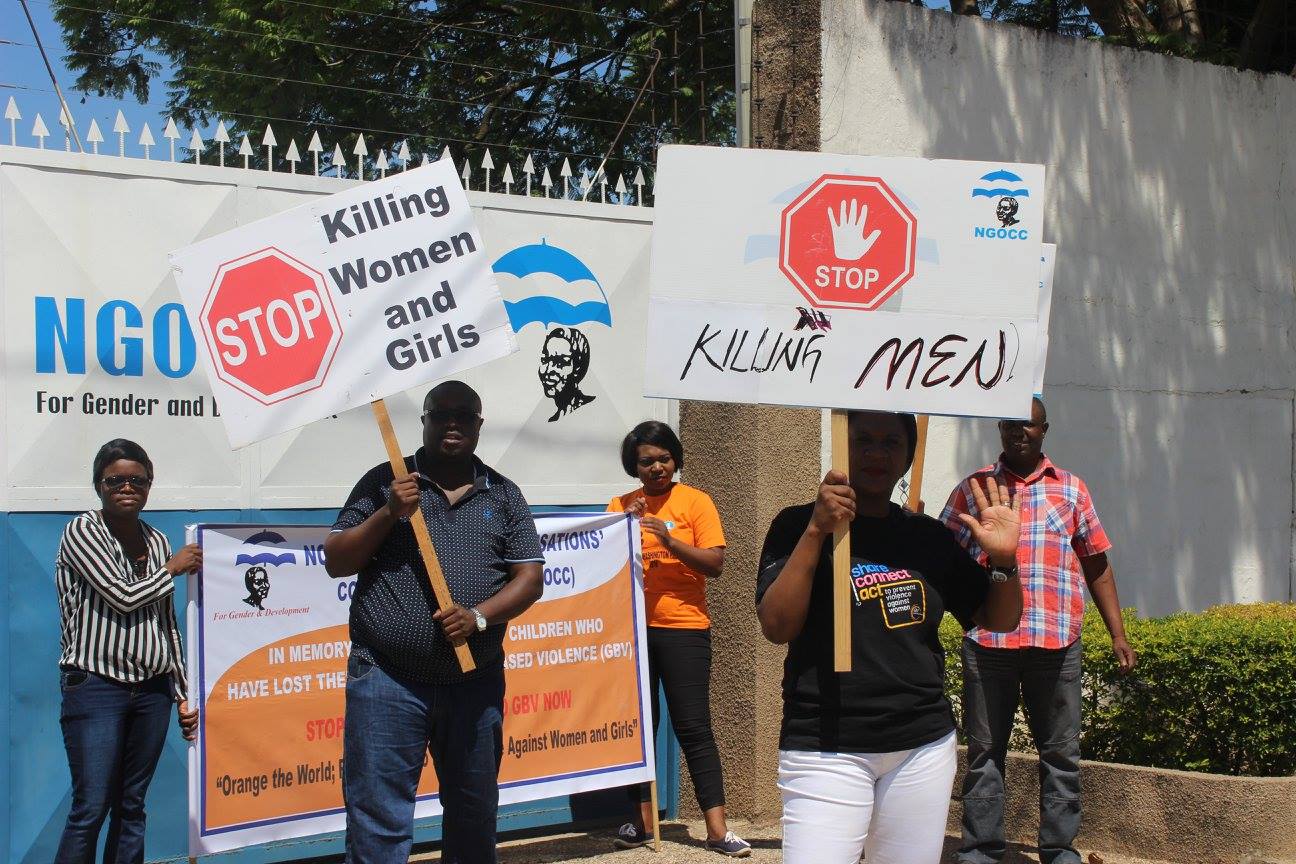
NGOCC fights for a good and safe world for children men and women
In addition, we have not witnessed any public efforts by relevant investigative bodies to follow up, adequately investigate and recommend for prosecution those named as having been involved in questionable financial transactions and corruption as per the Financial Intelligence Report of 2019.
This status quo has the tendency to render the country to be viewed negatively by the outside world and has the potential to jeopardize external development support. In this regard, we have in mind donor financing towards HIV and AIDS and other basic health programmes, Social Cash Transfer, community focused interventions on women’s empowerment and promotion of girls’ access to education, among many others.
NGOCC wishes to contend that justice dispensation must be obeyed in all respects without any selectivity and without regard to the type of matter upon which the courts have adjudicated on or needs to preside over.
Gender Based Violence
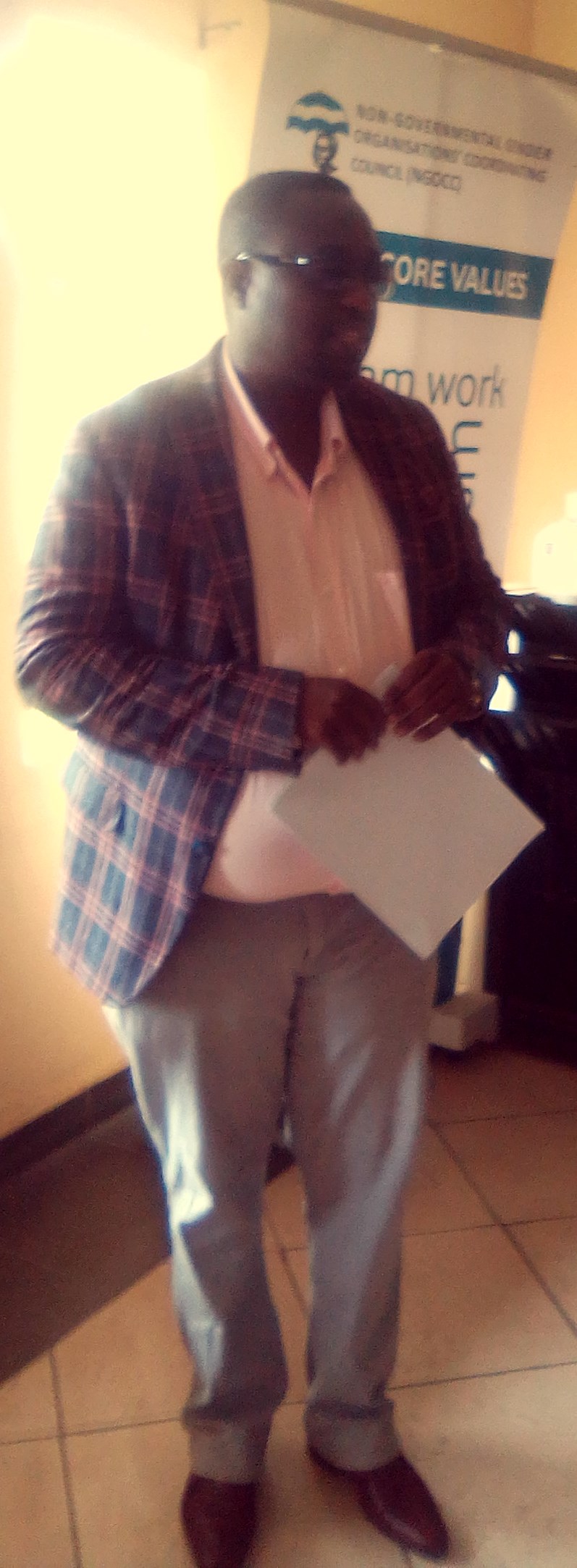
NGOCC Coordinator-Communication, Advocacy Networking Unit – Picture by Fulman James Mukobeko on Tuesday 31st December 2019
The increased cases of Gender Based Violence (GBV) every year, is of great concern to the women’s movement in Zambia. Going by the 2019 statistics, it is clear that this scourge is on the upswing and still carrying a female face due to the continued marginalization and vulnerability of many women and girls.
This can be illustrated through statistics which indicate that from a total of 773 child defilement cases recorded in the third quarter of 2019, 770 cases or 99.6% were against girls while only 3 cases or 0.4% were against boys.
In response to this challenge, NGOCC in September 2019, convened a multi-stakeholder National Indaba to find solutions to this crisis.
The Indaba was unanimous in acknowledging that all citizens have a role to play in order to put a stop to this dehumanizing vice by ending the culture of silence around GBV and taking specific actions to bring all perpetrators to justice.
NGOCC was also actively engaged on matters of ending Child Marriage (mostly negatively impacting on girl children) which have remained high in the country at 31%.
We note that mostly girls have been at the receiving end of this societal negative practice and hence driving the female faced poverty cycle.
Child Marriage is a matter that has various dimensions including social exclusion of those impacted; health implications which many times may be fatal; economic vulnerability of those facing this predicament as well as emotional and psychological aspects which creep in overtime.
This further excludes the affected young women and girls from actively engaging on issues that matter in society. The role that traditional leaders continue to play in ending this vice is commendable and it is our hope that many others will join this advocacy journey in 2020 and beyond.
NGOCC will continue to invest its time and resources on matters focused on ending GBV and Child Marriage.
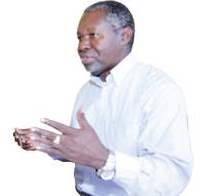
Mbita Chitala picture by Jean Mandela -javascript: void(0)
Climate Change and Load Shedding
The effects of Climate Change on the global world and Zambia’s development trajectory are real and calling for magnanimity of purpose in terms of mitigation and adaptability strategies. In 2019, we witnessed the deeply felt extent of this global effect on our environment in terms of the drought which hit (to a large extent) the southern and western parts of the country including the serious receding water levels in our rivers and major lake, Kariba. In addition, we noted that policy statements from our Executive were reassuring.
However, we await more practical and sustainable measures, including adequate resourcing of water harvesting innovations, climate smart agricultural interventions coupled with relevant research and development in order to address the effects of climate change on our people, especially as they affect the women and children. This also calls for conscious strategies in the manner in which our forest reserves are handled.
NGOCC also remains deeply concerned with the never ending operational and financial lapses with the Farmer Input Support Programme, Food Security Pack and other social protection mechanisms.
The load management by ZESCO has had adverse effects on businesses and indeed most low and middle income households. We have learnt that small businesses have literally been grounded to a halt in situations where alternative options have proved unaffordable by most small and medium enterprises.
Sadly, among the worst hit are the fresh foods businesses which are owned mostly by women in the informal sector. It is NGOCC considered view that the nation needs to marshal the needed political will and accountability mechanisms on this critical development ingredient (energy).
It is time that the nation directs more investment in alternative energy solutions for industry and household consumption in order to meaningfully address the situation.
Political Violence and Women’s Participation in Politics
In 2019, NGOCC remained deeply saddened at the high levels of political violence characterizing the conduct of major partisan political players.
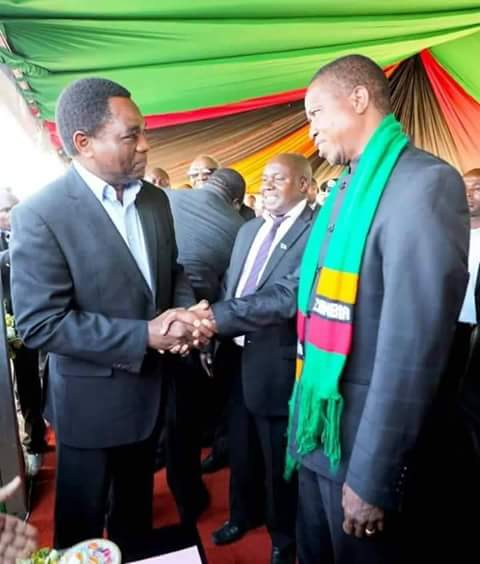
Hakainde Hichiema with Edgar Chagwa Lungu Wednesday in Choma 20 June 2018 (2)
We are particularly concerned at the high levels of intolerance and seemingly absence of political ideological contestation between the two major political parties – the Patriotic Front (PF) and United Party for National Development (UPND) – which even led to needless loss of lives.
Bye-Elections in 2019 were no longer an anticipated democratic space to spur electorates into exercising their right to vote given the violent nature of campaigns.
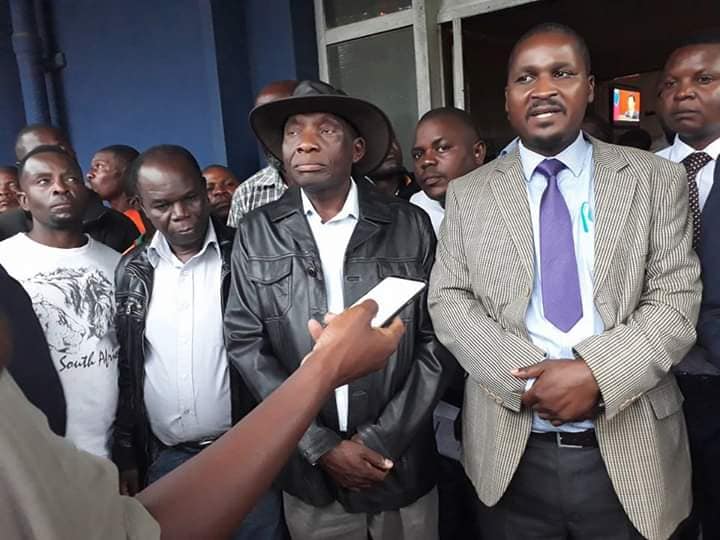
Charles Lubasi Milupi and Sean Tembo
The Sesheke, Kaoma and Roan Bye-Elections are examples of retrogressive campaigning that do not inspire confidence in our political party electioneering. In addition, we witnessed the sad violation and maiming of the president for Patriots for Economic Progress, Mr Sean Tembo, while exercising his rights on a publicly known accountability matter.
With all the above, it is NGOCC’s considered view that the Zambia Police did not adequately rise to the occasion in their role of maintaining law and order. Sadly, NGOCC is also aware that those officers who had exhibited professionalism while conducting their duties impartially were met with dismissals, much to the discontent of peace-loving citizens.
We all know for a fact that political violence of any form does not encourage much of women’s participation both as candidates as well as voters. No wonder we saw participating political parties not prioritizing adoption of women even in constituencies which had been rendered vacant due to the demise of female Parliamentary holders.
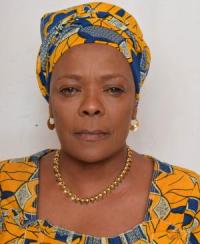
PF Chilubi MP Rosaria C Fundanga died aged 56 on 20th November 2019-http://www.parliament.gov.zm/node/5701
May the souls of Honourable
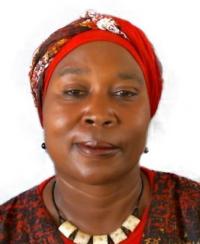
UPND Katuba MP Patricia C Mwashingwele born 30 Seotember 1198 died on 2nd May2 019
and Honorable Rosaria Fundanga, who left us in 2019, rest in eternal peace. Political violence should therefore be an area of greater focus going forward especially given Zambia’s standing on the continent and beyond, as a beacon of peace in the handing over of government power from one regime to another.
We also commend the Zambia Police for beginning the disarming process for all political cadres and implore them to be professional and conduct themselves in a fair and non-partisan manner.
CONCLUSION

Hakainde Hichiema with Edgar Chagwa Lungu Wednesday in Choma 20 June 2018 (2)
In conclusion we would like to appeal to all Zambians to put the country first in everything that we do. Before anything else, we are all Zambians with a duty to advance our country’s development pathway. By virtue of our collective resolve to uphold the “One Zambia, One Nation Motto”, we are all one people, female and male, regardless of tribe, colour, creed or political affiliation. Therefore, let us not allow politics or anything else to divide our great country.
On behalf of the NGOCC entire membership of 97 organisations, Board, Management and Staff we wish every Zambian a Happy and Prosperous 2020!
I THANK YOU AND GOD BLESS US ALL!























